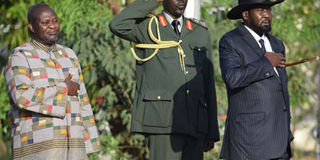Hybrid court solution to S. Sudan mistrust, says US diplomat

Former rebel leader Riek Machar (left) and President Salva Kiir listen to the national anthem during the swearing-in of Dr Machar as the new South Sudan first vice-president in Juba April 26, 2016. PHOTO | AFP
What you need to know:
- On Tuesday, Dr Machar finally returned to Juba and was sworn in to be President Kiir’s First Vice President, following days of delays over which weapons his troops were to bring in the country.
- The agreement signed in Addis Ababa, besides power sharing, also provides for the creation of a hybrid court composed of local and international judicial officers from the African Union member countries.
A top US diplomat says only a hybrid court in South Sudan will help eliminate the “climate of mistrust” between allies of President Salva Kiir and those of his new deputy Riek Machar.
Ms Samantha Power, the US envoy to the UN, said on Tuesday that South Sudan must do more to punish the main perpetrators of the violence that rocked the country since 2013.
“Until individual justice is done, until this hybrid court is set up expeditiously and the perpetrators of those crimes can be held accountable, there’s a risk of collective guilt.
“It’s very hard to overcome suspicion and mistrust of this depth simply by having people show up and say they’re on the road to peace,” she said in a briefing in New York, after a meeting of UN Security Council members.
On Tuesday, Dr Machar finally returned to Juba and was sworn in to be President Kiir’s first vice president, following days of delays over which weapons his troops were to bring into the country.
Dr Machar becomes Kiir’s deputy in line with a peace agreement they signed last year that was mediated by regional bloc IGAD.
But while the move signalled the end of a three-year civil war, the US diplomat argued there are several issues the two leaders must do to avoid a repeat.
“Both sides compromised to make this (agreement) to happen. It’s the best hope South Sudan has had in a very long time, and all UN Security Council members took note of that,” she said.
“But everyone is clear-eyed: the difficulties that emerged in orchestrating Riek Machar’s return to Juba are symptomatic of the larger climate of mistrust, all of the bloodshed that has occurred. And these are the factors and the root causes that have to be overcome if there is to be the necessary implementation of the IGAD agreement and the creation of the Transitional Government of National Unity,” she said.
The agreement signed in Addis Ababa, besides power sharing, also provides for the creation of a hybrid court composed of local and international judicial officers from the African Union member countries.
The idea is to bring to justice those leaders suspected to have perpetrated the killings, sexual assault and destruction of property since December 2013.
When asked whether the US would want President Kiir and Dr Machar to be held accountable, Ms Power said it is an issue that will be tackled once the court has been set up.
“Obviously command responsibility is a principle well enshrined in international law, but we’re not even at the point where that issue is being debated because the hybrid court has not progressed in a way that I think many in the African Union – and in IGAD – had hoped it would.”
She instead talked of “pillars” which Juba must build to help the country emerge from war. These include reforming the security system including unifying forces from the Kiir and Machar sides, disarming remaining splinter groups, transitional justice, and rebuilding the economy to wean people from humanitarian aid.
The US, the European Union, China, Norway, the African Union and other countries were instrumental in supporting the process that led to the agreement last year in August. But it was a deal reached following seven others that had been violated by the two parties.
On Tuesday, Ms Power revealed that South Sudan’s leaders only agreed to create a transitional unity government following sustained pressure from the international community.
“We’ve all learned the lesson: when things are going to happen in South Sudan, it tends not to happen just because gravity makes it happen; it happens because the international community unites and turns up the heat.
“If you look at when the IGAD agreement was signed, it was signed because of sustained pressure from IGAD, from the AU, from the UN Security Council.
“And if you look at the many intervening months that elapsed, it was only a surge in pressure – including from very specific African countries saying that they were no longer going to tolerate the government and Riek not coming together to reach compromise around Riek Machar’s return,” she said.




